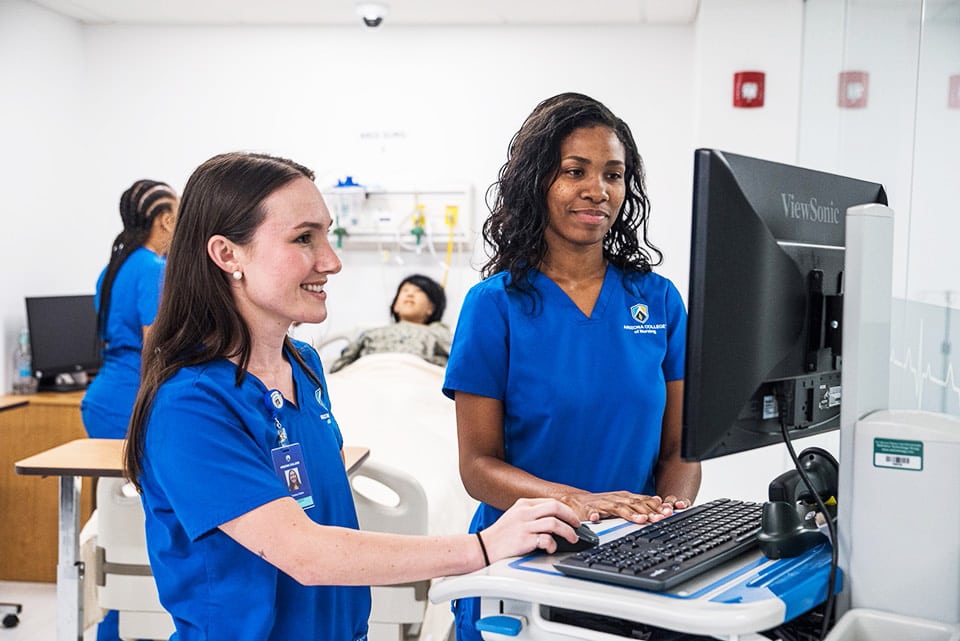
Pursuing a Bachelor of Science in Nursing (BSN) is often the best choice for a pathway to a nursing career. A full BSN degree program better prepares nurses with a background in research, leadership, and health policy than a certificate or associate degree. This broader background helps graduates provide the highest quality care possible in today’s dynamic healthcare environment.
This blog post will discuss what a BSN is, why this degree is desirable for nurses, and how to pursue a BSN if you are considering this degree program to become a registered nurse (RN).
What is a BSN?
A BSN is an undergraduate degree program that prepares individuals to become RNs. BSN programs go beyond providing technical nursing education such as that offered by an associate’s degree in nursing (ADN) or licensed practical nursing (LPN) program. BSN programs offer comprehensive nursing theory, leadership, evidence-based practice, and research courses. BSN programs, therefore, provide a solid foundation in both theoretical and clinical aspects of nursing.
 Through a BSN program, students complete biology, anatomy, physiology, pharmacology, and nursing research and leadership courses. Students also take courses in pediatric care, maternal-newborn care, and mental health in nursing care. Completing a BSN is a significant step in starting one’s nursing career. It is highly valued because of the comprehensive and rigorous nature of preparation.
Through a BSN program, students complete biology, anatomy, physiology, pharmacology, and nursing research and leadership courses. Students also take courses in pediatric care, maternal-newborn care, and mental health in nursing care. Completing a BSN is a significant step in starting one’s nursing career. It is highly valued because of the comprehensive and rigorous nature of preparation.
What career opportunities are available with a BSN degree?
The career opportunities for registered nurses after obtaining a BSN are vast. BSN-prepared nurses can practice across most specialties of nursing. These include, but are not limited to, the following types of settings:
- Hospital Settings: Many BSN graduates work in an acute care setting like a hospital after graduating. Hospitals often contain specialty units, including medical-surgical, emergency room, trauma/intensive care, labor and delivery, pediatrics, and psychiatric units. According to the Bureau of Labor Statistics, about 60% of registered nurses work in hospitals.
- Ambulatory Settings: BSN-prepared nurses are also needed in ambulatory or outpatient settings. These can include primary care offices, hospital-affiliated outpatient clinics, day surgical centers, visiting nursing associations, and more. You can learn more about ambulatory care nursing here at The American Academy of Ambulatory Care Nursing’s website. According to the Bureau of Labor Statistics, about 18% of registered nurses work in an ambulatory care setting.
- Long-Term Care and Skilled Nursing Facilities: BSN nurses may also choose to work in long-term care or skilled nursing facilities, which often provide a range of nursing services and chronic condition treatment to patients on a long-term basis. The Bureau of Labor Statistics estimates about 6% of nurses work in a long-term residential care or nursing facility.
- Government and Educational Services: The Bureau of Labor Statistics estimates that about 6% of nurses work in government settings and 3% in educational settings, indicating that these are areas where BSN nurses may also find employment after graduating.
Why do employers prefer hiring BSN-prepared nurses?
Another benefit of a BSN degree is that many employers prefer hiring BSN-prepared nurses in the current healthcare job market. This advantage again comes because BSN-prepared nurses are known to provide superior care to patients compared to their non-BSN-prepared counterparts. Many job descriptions for RN roles specifically state that a BSN is not just preferred but required for employment, which is why students should opt for a BSN degree as their pathway into entry-level nursing.
How does a BSN degree help with career advancement opportunities?
BSN-prepared nurses are also positioned well for career advancement and pursuing advanced nursing degrees if desired.
BSN-prepared nurses who develop their practice at the bedside may find themselves advancing into management or leadership positions. After gaining experience, they may also be able to transition into a nurse educator role in their chosen clinical setting.
Some nurses also return to graduate school to pursue a master’s or doctoral degree in nursing. Most of these programs require a BSN as a prerequisite for admission. Graduate nursing programs include nurse practitioner (NP), clinical nurse specialist (CNS), certified registered nurse anesthetist (CRNA), and certified nurse midwife programs. They can also include doctorate programs through which nurses can earn either a PhD in nursing or a doctor of nursing practice (DNP).
 Overall, a BSN lays the groundwork for advanced nursing practice by providing the necessary knowledge, skills, and competencies that provide the foundation for career growth at the bedside and for advanced degrees. Pursuing a BSN is a strategic step for individuals who aspire to take on advanced clinical, leadership, or educational roles within the nursing profession.
Overall, a BSN lays the groundwork for advanced nursing practice by providing the necessary knowledge, skills, and competencies that provide the foundation for career growth at the bedside and for advanced degrees. Pursuing a BSN is a strategic step for individuals who aspire to take on advanced clinical, leadership, or educational roles within the nursing profession.
What is the earning potential for BSN-prepared nurses?
BSN nurses may also enjoy higher earning potential than non-BSN-prepared counterparts due to the more comprehensive and rigorous coursework characteristic of BSN programs. It is also likely related to the excellent care BSN-prepared nurses are known to provide. This earning potential is yet another reason why earning a BSN is an excellent choice for your nursing degree.
While a direct comparison between BSN and non-BSN-prepared nursing pay is not readily available, the median annual wage for registered nurses in The United States, according to the Bureau of Labor Statistics, was $77,600 as of May 2021.
Author Bio
Tana Bao MSN, FNP-BC, NP-C, APRN
Tana Bao is an experienced advanced practice registered nurse. She earned her BSN from The University of Massachusetts Amherst in 2016 and her MSN from Thomas Jefferson University in 2019. She is board certified to practice as a family nurse practitioner with both The American Academy of Nurse Practitioners (NP-C) and The American Nurses Credentialing Center (FNP-BC). Clinically, she has worked in various medical settings including family planning, women’s health, sleep medicine, and primary care. She now also writes professionally as a health content writer and journalist and is also pursuing a post master’s certificate in nursing education.
Start Your Future in Nursing Today

If you’re considering a career as a registered nurse (RN), Arizona College of Nursing is here to help you pursue your dream. Our BSN program enables you to earn a Bachelor of Science in Nursing in just 3 years or less with qualifying transfer credits. We’ve helped hundreds of students to earn a BSN degree and enter the nursing profession – and we’re ready to support you on your path to becoming an RN.
Why Choose Arizona College of Nursing?
- Earn a BSN degree in 3 years or less with eligible transfer credits
- Campus locations throughout the US
- Night classes for general education courses
- Hybrid Online/In-Person format for general education classes
- Nursing education is all we do
- CCNE-Accredited Program*
- NCLEX-RN success coaches and exam preparation class
- Financial aid available to those who qualify
Discover Your Path to a Career in Nursing
Citations
- American Association of Colleges of Nursing. Fact Sheet: The Impact of Nursing Education on Nursing Practice.
- American Association of Colleges of Nursing. Employment of New Graduates and Employer Preferences for Baccalaureate-Prepared Nurses.
- American Association of Colleges of Nursing. Nursing Fact Sheet.
- American Association of Colleges of Nursing APRN Consensus Model.
- American Association of Colleges of Nursing. Your Guide to Graduate Nursing Programs.
- American Academy of Ambulatory Care Nursing. What is Ambulatory Care Nursing?
- Bureau of Labor Statistics
Information in this post is accurate as of September 29, 2023.
*The Bachelor of Science in Nursing (BSN) degree program at Arizona College of Nursing is accredited by the Commission on Collegiate Nursing Education (https://www.aacnnursing.org/). All Arizona College of Nursing and Arizona College campuses are institutionally accredited by the Accrediting Bureau of Health Education Schools (https://www.abhes.org/), a U.S. Department of Education-recognized accrediting agency.








